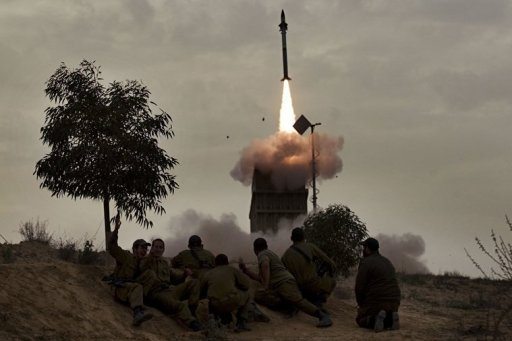Israel on Sunday began testing an SMS system for warning the public of an imminent missile attack as chatter over a possible strike on Iran dominated the Israeli press headlines.
As testing began, Prime Minister Benjamin Netanyahu said Israel had chalked up “a significant improvement” in its home front defence capabilities, mentioning its highly-vaunted anti-missile systems such as Iron Dome and Arrow 2.
“There has been a significant improvement in our level of defence capacity on the home front: with Iron Dome, with the Arrow, in terms of protection and shelters, in advanced warning systems and in other areas,” he said at the start of the weekly cabinet meeting.
“But all the threats which are directed towards the Israeli home front are dwarved by another threat — different in both its scope and its essence. And so I repeat: Iran must never be allowed to get nuclear weapons.”
With front page stories in two papers suggesting Tehran had made progress towards the manufacture and assembly of a nuclear warhead, Israel’s Home Front Command began final tests of the SMS warning system which is expected to be operational by September.
“The Home Front Command will today start conducting nationwide testing of the ‘Personal Message’ alert system, which will end on Thursday,” said a statement indicating that SMS texts in Hebrew, Arabic, English and Russian would be sent to subscribers on Israel’s three main networks: Cellcom, Pelephone and Orange.
The idea is that the SMS system could be used to warn the population of an imminent missile attack by Iran or Lebanon’s Hezbollah militia if Israel strikes Tehran’s nuclear facilities which it believes is a front for developing a bomb.
In recent days, talk of a possible strike on Iran has dominated the headlines, largely coming from unsourced officials quoting intelligence reports, none of which it was possible to verify.
“Iran has made progress toward nuclear warhead,” was the headline in the Haaretz newspaper.
“The Iranians greatest progress recently is in the manufacture and assembly of a nuclear warhead,” the paper said, quoting the official who was drawing his information from an intelligence report which an Israeli newspaper said was recently presented to US President Barack Obama.
Although US officials declined to comment on the report, Israeli Defence Minister Ehud Barak referred to it directly last week, saying it “brings the American assessment much much closer to ours” and makes the Iranian issue “a bit more urgent.”
“Not prepared for war” was the headline in Yediot Aharonot, which questioned Israel’s readiness to both mount a decisive military strike and to cope back home with the expected fallout.
“Will those preparations be enough to deal a crushing blow to Iran’s nuclear facilities and allow Israel to cope with the repercussions of such an attack?” it said. “It is not at all clear that that is the case.”
It quoted statistics saying 700,000 civilians did not have bomb shelters, only half of Israel’s population of 7.8 million people had gas masks, and that work to fortify 70 percent of the country’s hospitals would not be completed until 2015.
Although Israel charges that its arch foe Iran is driving for a nuclear bomb, the US intelligence services say only that they suspect it is seeking a weapons capability but that no decision has been taken on actually making one.
Israel is widely suspected to have the region’s sole, if undeclared, nuclear arsenal.










